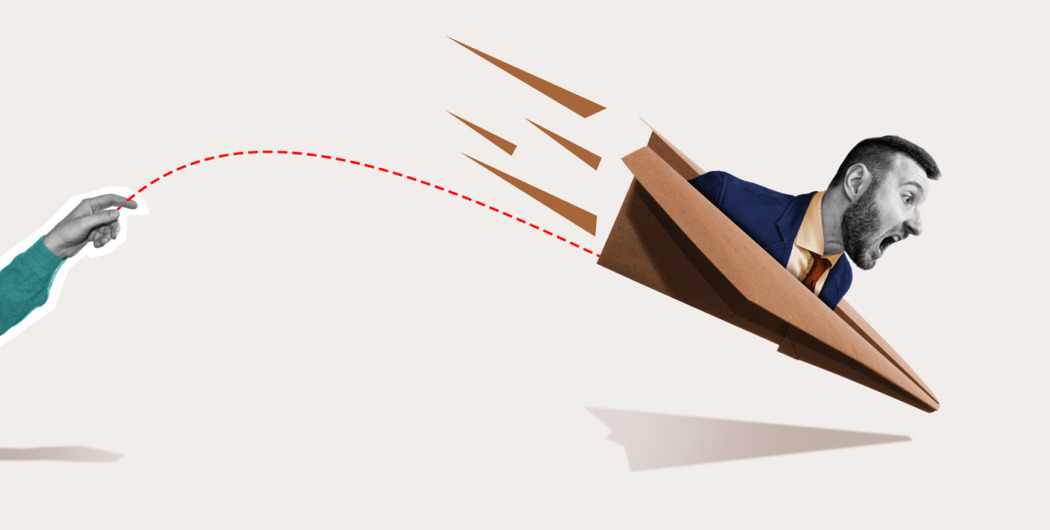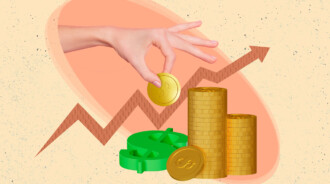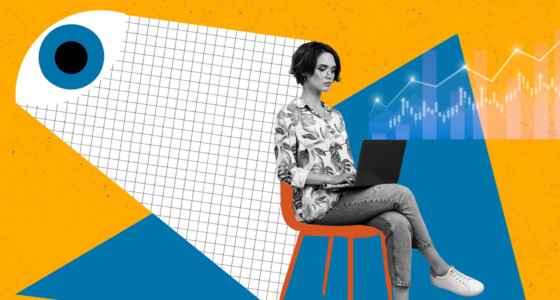

Anxiety and fear can paralyze you both physically and emotionally. But it can be turned into a good thing. Edward Watkins, Professor in Experimental and Applied Clinical Psychology at the University of Exeter, describes:
- “First, by worrying about something, we are more likely to think of reasons to take action and be motivated to do something.
- Second, worry acts as a reminder to do things – a mental process to make sure we try and tackle it…
- Third, worry can involve effective preparation, planning and problem-solving.”
Some famous examples of when traders reacted to emotion and fear were panic selling during the Wall Street crash of 1929 (12.9 million shares sold) and Dubai’s housing crash in 2009 (Dubai World shares worth billions). Also, you may have heard about the panic buying of toilet paper, but you may not know that it happened multiple times in history – 1973, 2013, and 2020.
Let’s first see what general thought patterns can create a debilitating negative spiral. Then, you’ll learn how to overcome four specific fears that so many traders suffer from.
Why you fear trading
Experts at Anxiety Canada compiled a list of thinking traps that can convince you of impending doom:
- Catastrophizing: Jumping to the worst possible conclusions. “If I don’t pick the right stock right now, everything will be gone.”
- Mind reading: Trying to guess what other people think. “Other traders think my portfolio is not good enough.”
- Fortune telling: Imagining future events without any clear basis. “I have bad luck, so every stock I buy will plummet.”
- Black-and-white thinking: Seeing things in extremes. “I’ll either be extremely rich or extremely poor.”
- Overgeneralizing: Making a statement about something that is too general. “One time, I had a losing trade when I picked a stock from the fintech sector. I must never trade in this sector again.”
Fear of losing out
If you’re afraid of losing funds, it can trigger all kinds of irrational moves. The best-case scenario is just freezing and doing nothing. What’s worse is delaying your execution or timing strategies, which actively contributes to you losing even more capital.
Of course, no one wants to lose. But as long as you accept that it can happen sometimes, you’ll have more confidence in your decisions. One loss won’t put you off track; quite the opposite — you’ll see it as a natural progression of your trading journey.
Here is a trick to overcome this fear: make small trades. It’ll teach you that even sound strategies don’t always generate winning trades, and you’ll keep your overall losses to a minimum.
Fear of missing out
If you are always on the lookout for the next big thing, you’ll probably develop FOMO. Wherever you go online, you can’t seem to escape traders raving about a groundbreaking project and saying you should get in early. Even if you disregard it the first few times, you may start feeling jealous of others’ success and, you guessed it, making unreasonable trades.
If you see some stock trending, don’t buy it just because you’re worried about missing an opportunity. Apply the same analytical approach you normally do. If you evaluate the stock and it seems promising, you should join the trend. The difference between that and FOMO is that you don’t let the market sentiment make decisions for you.

Fear of profits turning into losses
This fear can force you to cut your favorable positions before they generate a meaningful return, i.e., too early. The advice given to traders to resist this impulse is “let your profits run.”
At its core, the urge to lock your profits is not bad, just like limiting your losses. But if you’re too cautious, trading will no longer be financially viable. If you’re a conservative trader, consider taking profits at the target objective using a take-profit order. If you’re more motivated to take advantage of the market, you can place a trailing stop to ride the trend and avoid taking profits off the table.
Here are some good reasons to sell your assets, which have nothing to do with fear:
- You regret buying them in the first place.
- Their value has risen dramatically.
- The asset has an unsustainable trading price.
Fear of not being right
This mindset can also manifest itself as the fear of not doing something right or the fear of not being good enough. If you become so wrapped up in your trading performance that any setbacks affect your self-worth and mental wellbeing, it’s a bad sign. There is nothing wrong with seeking and savoring achievements or generating meaningful experiences from trading. Just accept that being sometimes wrong doesn’t mean you’re a bad trader.
You need to remind yourself that the goal is to be right in the long-term perspective, not at each given moment. You can make a few mistakes right after reading this article. What’s more important is whether you made progress in the last few weeks and months, whether your trading gains exceed your losses — other things are just distractions.
If you feel emotions getting the better of you, end your trading session early. Whether you day trade, swing trade, or invest, you need to adopt the right mentality: one that doesn’t allow emotions to make your decisions.
Fear of being wrong
As humans, we were wired to be right, ever since our childhood days. Think about it. We go to school, and we receive good grades for what is accepted to be the right answer. The more correct answers we give, the better our portfolio becomes, and the better our lives.
When we are right, we reaffirm our self-worth. We avoid being wrong, mainly because it is embarrassing and often leads to unfortunate scenarios. It’s been ingrained into us that we need to be right to succeed, which is why we cannot comprehend the concept of being wrong.
In trading, this is not always important. You may be right 70% of the time, but your losses may be bigger than your wins. For example, let’s say that a winning trade will be worth $1 and a losing trade will cost you $3. If you have 3 losses and 7 wins, you’ll still be losing $2.
On the other hand, let’s say that a winning trade will bring you $3 and a losing one will take $1. You may only get 3 trades right and get 7 wrong, but you’ll still make $2. You just need to accept that you don’t need to be right all the time to be successful as a trader. Depending on the case, being wrong can bring even more profit.
Fear of the unknown
When you are trading, you cannot know how much you are going to win – or worse, lose. When the prices go in a way you don’t expect them to, you are subjected to unknown market forces. This can leave you feeling helpless and paralyzed.
During these moments, you have no idea whether the price will go back on track or not. It may get in your favor, or it may continue to work against you. At this point, all you can do is keep on hoping that everything will go right.
This fear of the unknown is very often a result of a lack of education. This is very common among new traders, who are still learning their way around the world of trading. Moreover, treading is often pictured as something “rosy and bright,” with great income potential. This changes when people experience their first loss, switching to fear.
The best way to overcome this fear is to learn as much about trading as you possibly can. Start by taking a couple of trading courses or maybe read a few trading books.
Fear of giving back profits
Making a profit is perceived as a great success for a trader, especially one at the beginning of the road. As a result, when you make a profit, you will do whatever it takes to make sure that income is kept safe.
For example, a specific trade would normally earn you up to $10. You reach the $5 earning threshold, and to protect that profit, you close the trade before it has the chance to mature. You figure that earning only $5 is better than risking a market change.
In the world of trading, this is known as the fear of giving back profit. The best way to overcome this fear is to create a trading plan and follow through with it. Don’t allow emotions to influence your trading moves.
Conclusion
Fear is a human emotion, and it’s normal to be afraid of losing a trade here and there. That being said, a lost trade does not necessarily mean you lost profit too. Getting over this fear will only push you higher. Keep your cool and make all of your decisions based on a plan.










